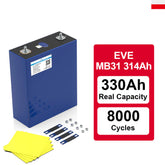¿Es seguro almacenar las baterías de herramientas eléctricas en el garaje?
A la hora de almacenar baterías de herramientas eléctricas, elegir la ubicación adecuada es crucial para mantener su rendimiento y longevidad. Muchas personas consideran el garaje un lugar de almacenamiento práctico, pero ¿es realmente seguro almacenar allí las baterías de herramientas eléctricas? Esta guía explora los factores que influyen en la seguridad del almacenamiento de baterías y ofrece consejos prácticos para proteger su inversión.
- Comprensión de los conceptos básicos del almacenamiento de baterías de herramientas eléctricas
- ¿Se pueden almacenar las baterías de herramientas eléctricas en el garaje?
- Mejores prácticas para almacenar baterías de herramientas eléctricas de forma segura
- Qué evitar al almacenar baterías de herramientas eléctricas
- Cómo almacenar baterías de herramientas eléctricas durante períodos prolongados
- Alternativas al almacenamiento de baterías de herramientas eléctricas en el garaje
- Los beneficios del almacenamiento adecuado de la batería
- Almacenamiento seguro de las baterías de herramientas eléctricas
Comprensión de los conceptos básicos del almacenamiento de baterías de herramientas eléctricas
Por qué es importante almacenar adecuadamente la batería
Las baterías de las herramientas eléctricas son componentes esenciales, ya que garantizan eficiencia y fiabilidad en el trabajo. Un almacenamiento inadecuado puede reducir su vida útil, su rendimiento e incluso generar riesgos de seguridad. Para aprovechar al máximo sus baterías, es fundamental almacenarlas correctamente.
Tipos de baterías comunes utilizadas en herramientas eléctricas
Antes de profundizar en los consejos de almacenamiento, es útil conocer los tipos de baterías que se encuentran comúnmente en las herramientas eléctricas:
- Iones de litio (Li-ion) : ligeras, duraderas y eficientes, estas son las baterías más populares para las herramientas eléctricas modernas.
- Níquel-cadmio (NiCd) : más antiguas pero todavía en uso para ciertas herramientas, estas baterías son duraderas pero más pesadas y propensas al efecto memoria.
- Níquel-metal hidruro (NiMH) : un avance respecto del NiCd, que ofrece mayor capacidad y es más respetuoso con el medio ambiente.
Cada tipo de batería tiene requisitos de almacenamiento únicos, que abordaremos en este artículo.
>>Vea también Alternativas y sustitutos de baterías LR1130, AG10, 389, 390
¿Se pueden almacenar las baterías de herramientas eléctricas en el garaje?
El papel de la temperatura en la seguridad de la batería
La temperatura es un factor clave para determinar si es seguro almacenar las baterías de herramientas eléctricas en el garaje. Los garajes suelen experimentar fluctuaciones extremas de temperatura, lo que puede afectar negativamente la salud de las baterías.
Temperaturas frías
- Las baterías, especialmente las de iones de litio, pierden capacidad y se descargan más rápido en ambientes fríos.
- La exposición prolongada a condiciones de congelación puede causar daños permanentes.
Altas temperaturas
- El calor acelera las reacciones químicas dentro de la batería, lo que puede provocar sobrecalentamiento o hinchazón.
- La exposición prolongada a temperaturas superiores a 35 °C (95 °F) puede reducir significativamente la vida útil de la batería.
La humedad y sus efectos
Los garajes pueden ser propensos a altos niveles de humedad, lo que puede provocar:
- Corrosión de los terminales de la batería.
- Mayor riesgo de cortocircuitos.
- Degradación acelerada de las celdas de la batería.
Riesgo de daño físico
En muchos talleres, las baterías pueden almacenarse cerca de herramientas, equipos pesados u objetos afilados. Esto aumenta la probabilidad de daños accidentales, como perforaciones, que pueden suponer un riesgo para la seguridad.
Mejores prácticas para almacenar baterías de herramientas eléctricas de forma segura
Cómo elegir el entorno de almacenamiento adecuado
Para almacenar las baterías de herramientas eléctricas de forma segura, siga estas pautas:
Mantener la temperatura óptima
- Guarde las baterías en un entorno con clima controlado, idealmente entre 15 °C y 25 °C (59 °F y 77 °F).
- Evite colocarlos directamente sobre pisos de concreto, ya que esto puede generar problemas relacionados con la temperatura.
Gestionar los niveles de humedad
- Utilice un deshumidificador en su garaje si la humedad es un problema.
- Guarde las baterías en un recipiente sellado e impermeable para minimizar la exposición a la humedad.
Organice el almacenamiento adecuadamente
- Designe un área específica para almacenar la batería, lejos de otras herramientas o elementos potencialmente dañinos.
- Mantenga las baterías en su embalaje original o en sus estuches protectores para evitar daños accidentales.
Qué evitar al almacenar baterías de herramientas eléctricas
No almacene baterías completamente cargadas o completamente agotadas
Las baterías de iones de litio, en particular, deben almacenarse con una carga aproximada del 40-60 %. Almacenarlas completamente cargadas o completamente descargadas puede provocar una pérdida de capacidad con el tiempo.
Evite almacenar baterías cerca de fuentes de calor
Nunca coloque las baterías cerca de dispositivos que emitan calor, luz solar directa ni materiales combustibles. Esto minimiza el riesgo de sobrecalentamiento y posibles incendios.
Evite mezclar tipos de baterías
Las baterías de diferentes tipos pueden reaccionar si se almacenan juntas en estrecho contacto. Separe siempre los tipos de batería para garantizar la seguridad.
Cómo almacenar baterías de herramientas eléctricas durante períodos prolongados
Preparación para el almacenamiento a largo plazo
Si no va a utilizar las baterías de su herramienta eléctrica durante un período prolongado:
- Limpiar los terminales : elimine la suciedad y los residuos de los terminales de la batería.
- Cargar al 40-60% : asegúrese de que la batería esté parcialmente cargada antes de guardarla.
- Elija la ubicación adecuada : opte por un entorno fresco, seco y estable, preferiblemente en el interior.
Mantenimiento regular durante el almacenamiento
Incluso almacenadas, las baterías requieren atención periódica:
- Verifique su carga cada 3 a 6 meses y recárguela al 40-60% según sea necesario.
- Inspeccione si hay signos de daño, como hinchazón o fugas.
Alternativas al almacenamiento de baterías de herramientas eléctricas en el garaje
Si el garaje no es adecuado, considere estas alternativas:
Utilice un armario de almacenamiento de baterías
Invierta en un gabinete de almacenamiento ignífugo y con temperatura controlada, diseñado específicamente para baterías.
Almacenar en interiores
Un armario o cuarto de almacenamiento dentro de su hogar proporciona un entorno más estable para las baterías, protegiéndolas de temperaturas y humedades extremas.
>>Vea también ¿Qué se puede alimentar con un generador de 2000 vatios?
Los beneficios del almacenamiento adecuado de la batería
Seguir las prácticas de almacenamiento adecuadas garantiza que:
- Sus baterías mantienen un rendimiento óptimo durante su vida útil.
- Reduce el riesgo de riesgos de seguridad como sobrecalentamiento, fugas o incendios.
- Ahorra dinero al evitar reemplazos prematuros de batería.
Almacenamiento seguro de las baterías de herramientas eléctricas
¿Es seguro guardar las baterías de las herramientas eléctricas en el garaje? Aunque el garaje pueda parecer conveniente, a menudo no proporciona el entorno estable que necesitan las baterías. En su lugar, concéntrese en la temperatura, la humedad y la protección física para garantizar la longevidad y la seguridad de sus baterías.
Siguiendo los consejos de esta guía, podrá maximizar el rendimiento de sus baterías y mantener sus herramientas listas para la acción. Un cuidado adecuado comienza con un almacenamiento adecuado, ¡así que conviértalo en una prioridad hoy mismo!
























Leave a comment
All blog comments are checked prior to publishing